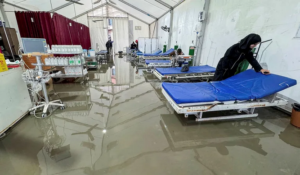Israeli physicians should stand up for their Gazan colleagues, detained and tortured during the war

A field hospital flooded following heavy rains, amid the Israel-Hamas conflict, Khan Younis in southern Gaza
Guy Shalev writes in Haaretz on 13 March 2025:
Dr. H., a 30-year-old orthopedist, was arrested in March 2024 while on duty at Nasser Hospital in the Gaza Strip, dressed in his medical uniform. After 69 days of abuse in the Sde Teiman detention camp he was transferred to an interrogation facility in Ashkelon while in need of urgent surgery.
“I told the doctor: ‘We are professional colleagues – you should treat me with humanity.’ In response, he slapped me while I was still blindfolded and said, ‘You are a terrorist.'”
The medical profession aspires to universality and humanism. Physicians worldwide practice medicine based on a shared human anatomy, guided by global research, and committed to strict ethical principles. Medical ethics, at times, set an almost utopian standard, demanding that medical professionals rise above sectarian loyalties and moral judgments.
Yet, Dr. H. invokes this very principle in his statement – the ethical duty to recognize the shared humanity of every individual. Physicians are bound to see the person before them as a human being, even in extreme circumstances where society may dictate otherwise. In this context, the Israeli physician’s slap was not only a rejection of a shared communal affiliation but also a fundamental betrayal of medical ethics.
More than 250 medical personnel have been arrested from the Gaza Strip by the Israeli military. Over 150 remain detained in Israeli facilities, with four having already died in custody. Some have been released in the most recent prisoner swap deals .
Lawyers representing Physicians for Human Rights Israel (PHRI) have visited 24 of these detainees across several facilities to better understand the circumstances of their arrests and the conditions in which they are being held. The collected testimonies reveal that most were arrested inside hospitals while performing their medical duties. All describe being stripped, humiliated, and beaten and have since been held in harsh conditions, enduring violence, torture, and starvation. No charges have been filed against them, and in the procedures extending their arbitrary detentions – taking place without adequate legal representation – Israeli security forces have failed to present credible evidence linking them to violent or illegal activities.
The report released by PHRI documents the mass arrest of medical personnel in Gaza. This is a clear and unabashed violation of the special protections granted to healthcare workers in armed conflicts, in accordance with the Geneva Conventions and international humanitarian law.
Furthermore, arresting and removing physicians during wartime critically undermines the Gaza’s healthcare system’s ability to care for the thousands of civilians in urgent need. For these reasons, and out of a sense of commitment to their peers, the Israeli medical community must speak out in protest, demonstrate solidarity, and demand the immediate release of the detained physicians.
Regrettably, what we have witnessed instead is a resounding silence –one that is an affront to their colleagues and a breach of their commitments as medical professionals. The blow, therefore, is not solely struck by one physician in an interrogation room, but by the collective hand of thousands within the Israeli healthcare community.
The medical community takes pride in being a learning community. Physicians are obligated to engage in lifelong learning and remain informed about the latest breakthroughs in research and standards of care. Now, the medical community in Israel has a unique opportunity to learn – not in international conferences, but right here, from Israeli colleagues who are courageously speaking out against ethical violations, refusing to participate in actions that undermine medical ethics, and demanding an end to policies that conflict with these principles.
They can learn from Palestinian peers who remain unwavering in their commitment to patients and the values of the medical profession –despite their families being displaced, working without pay, and facing constant threats to their lives. They can learn from a paramedic who braved scorched roads to reach a child whose entire family was killed in an Israeli shelling, from a nurse who was the last to remain at the Indonesian hospital in northern Gaza, or from Dr. Hussam Abu Safiya, director of Kamal Adwan Hospital, who stayed by the side of the last of his patients before being forcibly disappeared into Israeli detention.
We have much to learn from our colleagues in Gaza. Let us start by standing with them and demanding their release.
Dr. Guy Shalev (PhD) is a medical anthropologist and the executive director of Physicians for Human Rights-Israel.
This article is reproduced in its entirety
